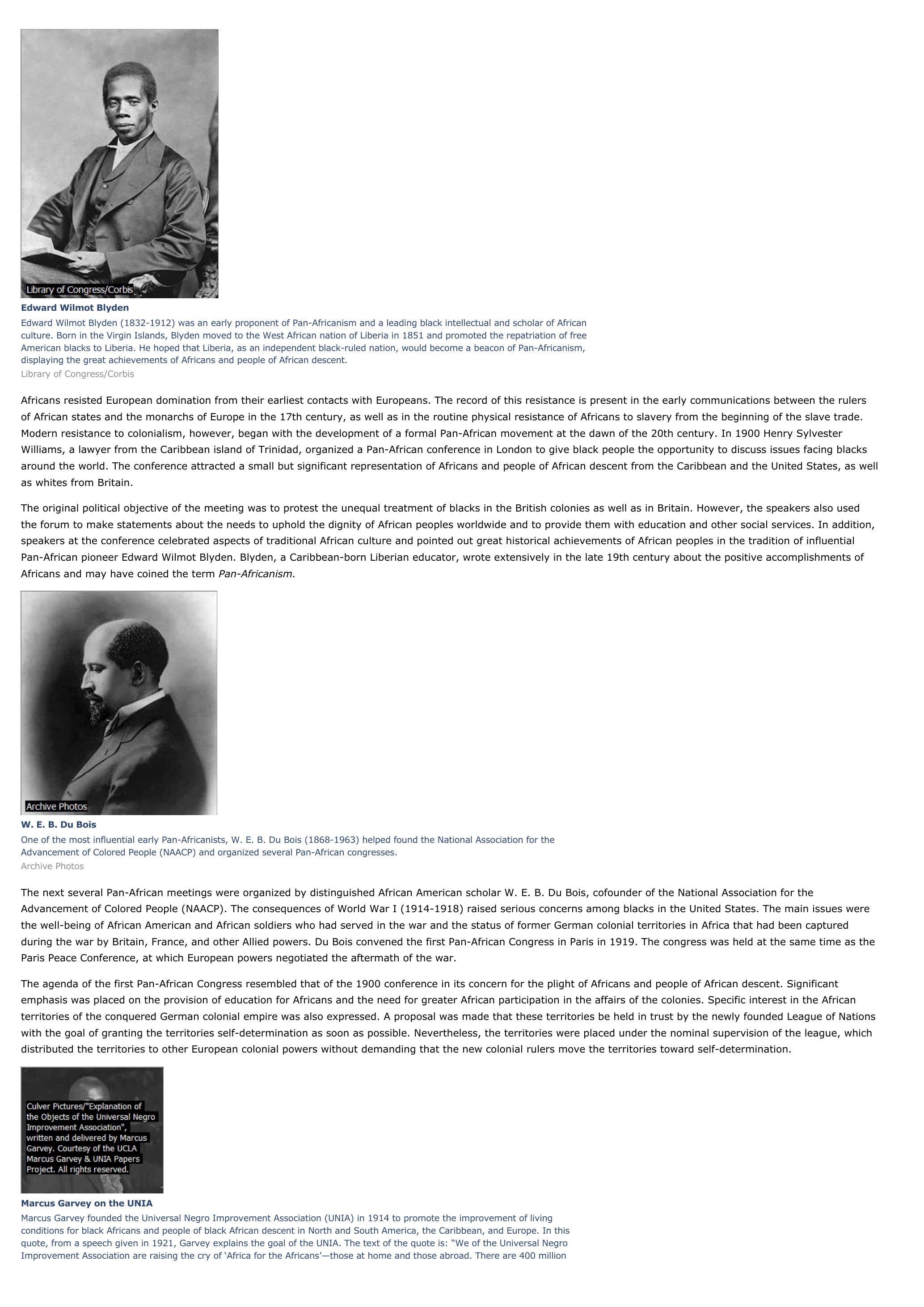Pan-Africanism - history.
Publié le 26/05/2013

Extrait du document
«
Edward Wilmot BlydenEdward Wilmot Blyden (1832-1912) was an early proponent of Pan-Africanism and a leading black intellectual and scholar of Africanculture.
Born in the Virgin Islands, Blyden moved to the West African nation of Liberia in 1851 and promoted the repatriation of freeAmerican blacks to Liberia.
He hoped that Liberia, as an independent black-ruled nation, would become a beacon of Pan-Africanism,displaying the great achievements of Africans and people of African descent.Library of Congress/Corbis
Africans resisted European domination from their earliest contacts with Europeans.
The record of this resistance is present in the early communications between the rulersof African states and the monarchs of Europe in the 17th century, as well as in the routine physical resistance of Africans to slavery from the beginning of the slave trade.Modern resistance to colonialism, however, began with the development of a formal Pan-African movement at the dawn of the 20th century.
In 1900 Henry SylvesterWilliams, a lawyer from the Caribbean island of Trinidad, organized a Pan-African conference in London to give black people the opportunity to discuss issues facing blacksaround the world.
The conference attracted a small but significant representation of Africans and people of African descent from the Caribbean and the United States, as wellas whites from Britain.
The original political objective of the meeting was to protest the unequal treatment of blacks in the British colonies as well as in Britain.
However, the speakers also usedthe forum to make statements about the needs to uphold the dignity of African peoples worldwide and to provide them with education and other social services.
In addition,speakers at the conference celebrated aspects of traditional African culture and pointed out great historical achievements of African peoples in the tradition of influentialPan-African pioneer Edward Wilmot Blyden.
Blyden, a Caribbean-born Liberian educator, wrote extensively in the late 19th century about the positive accomplishments ofAfricans and may have coined the term Pan-Africanism.
W.
E.
B.
Du BoisOne of the most influential early Pan-Africanists, W.
E.
B.
Du Bois (1868-1963) helped found the National Association for theAdvancement of Colored People (NAACP) and organized several Pan-African congresses.Archive Photos
The next several Pan-African meetings were organized by distinguished African American scholar W.
E.
B.
Du Bois, cofounder of the National Association for theAdvancement of Colored People (NAACP).
The consequences of World War I (1914-1918) raised serious concerns among blacks in the United States.
The main issues werethe well-being of African American and African soldiers who had served in the war and the status of former German colonial territories in Africa that had been capturedduring the war by Britain, France, and other Allied powers.
Du Bois convened the first Pan-African Congress in Paris in 1919.
The congress was held at the same time as theParis Peace Conference, at which European powers negotiated the aftermath of the war.
The agenda of the first Pan-African Congress resembled that of the 1900 conference in its concern for the plight of Africans and people of African descent.
Significantemphasis was placed on the provision of education for Africans and the need for greater African participation in the affairs of the colonies.
Specific interest in the Africanterritories of the conquered German colonial empire was also expressed.
A proposal was made that these territories be held in trust by the newly founded League of Nationswith the goal of granting the territories self-determination as soon as possible.
Nevertheless, the territories were placed under the nominal supervision of the league, whichdistributed the territories to other European colonial powers without demanding that the new colonial rulers move the territories toward self-determination.
Marcus Garvey on the UNIAMarcus Garvey founded the Universal Negro Improvement Association (UNIA) in 1914 to promote the improvement of livingconditions for black Africans and people of black African descent in North and South America, the Caribbean, and Europe.
In thisquote, from a speech given in 1921, Garvey explains the goal of the UNIA.
The text of the quote is: “We of the Universal NegroImprovement Association are raising the cry of ‘Africa for the Africans’—those at home and those abroad.
There are 400 million.
»
↓↓↓ APERÇU DU DOCUMENT ↓↓↓
Liens utiles
- Ideology and Rationality in the History of the Life Sciences
- HISTOIRE DU RÈGNE DE L'EMPEREUR CHARLES-QUINT [The History of the Reign of the Emperor Charles V].
- HISTOIRE DU MONDE [History of the World].
- GRANDISON (L') [The History of sir Charles Grandison]. (résumé)
- Robin George Collingwood, The Ides of History, 1946, Oxford University Press, 1994, p. 429 sv., trad. pers.


